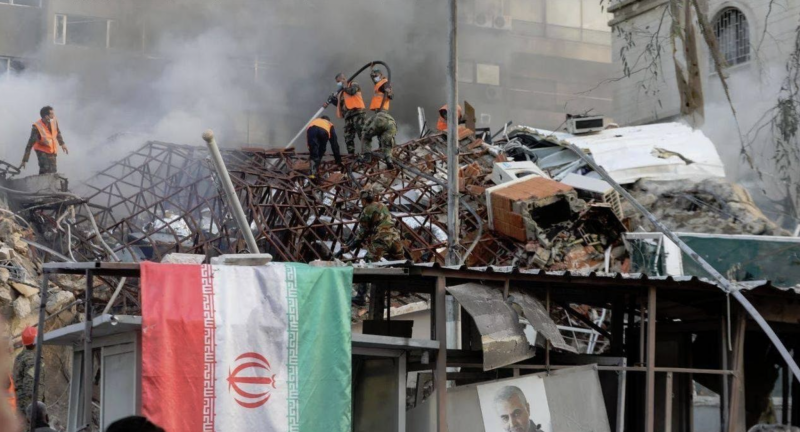
First responders at work on the Iranian embassy annex building in Damascus, following Israeli airstrikes on April 1, 2024. (Credit: Louai Beshara/AF)
Syria has largely disappeared from the media’s radar, only coming under the spotlight when Israel targets Iranian militia leaders within its borders. In such cases, a certain anxiety seems to take hold among some Middle East analysts.
For more than a decade, militias have brought death and desolation alongside Bashir al-Assad, shifting the country’s demographic as they settled their own families in place of the millions of Syrians driven out of their homes. But some commentators only seem concerned about Iranian imperialism when its architects are targeted.
So, contrary to the opinion of a large part of the Middle East’s population, the fight against Iranian influence is increasingly perceived as a factor of regional instability and a broader conflict, rather than Iranian imperialism itself.
While Israeli strikes force these same commentators to renew their interest in Syria, the country’s fate remains of little interest to them.
Misery on the market
Thirteen years after a popular uprising and the outbreak of a war waged by the regime against its own people, the country continues its descent into the abyss: There is nothing left of the Syrian state other than a mafia-like government that finances its repressive machine through drug trafficking.
Eighty percent of Syrians live in extreme poverty, unable to meet their most basic needs, barred from accessing education, health care, transport, and energy.
What little wealth the country does have, including in gas and phosphate, was offered to the Syrian regime’s Russian and Iranian sponsors for their exploitation. If Syrians survive in regime-controlled areas, it’s largely thanks to remittances.
The Syrian government has turned misery into a market: Wife of Syria’s head butcher and first lady to the blood-stained regime, Asma al-Assad controls the majority of UN humanitarian aid via her NGO, the Syria Trust for Development. In plain view of UN employees in Damascus, this aid ends up in market stalls in Syrian towns.
Asma al-Assad’s greed is not limited to the misappropriation of humanitarian aid. In her mission to establish her financial empire, she also robs businessmen struggling for success in a country in ruins. The disastrous humanitarian situation is at the root of protests in the Druze-minority province of Sweida, ongoing now for for almost eight months.
The population, out of breath and exhausted, can no longer stand the fact that the authorities are using misery as a tool. They blame their drawn-out agony on the West and its sanctions. While more than half of Syria’s 10 million inhabitants have been forced into exile, those who have stayed are sparing no means to flee, but the money collected by smugglers ends up in the regime’s pockets.
Strategic blindness
And where is the UN in all this? In December 2015, the Security Council adopted Resolution 2254 calling for an immediate cease-fire, the formation of a transitional government within six months, and a constitutional committee to draft a constitution for future free elections. Vladimir Putin’s reason for not vetoing this resolution was to gain time, which he used for the military reconquest of Aleppo, Daraa, Ghouta...
The resolution remains entirely unfulfilled but UN Special Envoy to Syria Geir Pedersen continues to organize meetings of the Syrian Constitutional Committee nonetheless.
The sterility of his approach reflects the West’s indifference, having left Syria in the hands of Putin and Iran. There has been no transitional government, no cease-fire, and none of the over 130,000 detainees held in Assad’s prisons have been released. Members of the Constitutional Committee were appointed in September 2019 and more than a third of them are regime supporters.
Political inaction is unfortunately not the only shortcoming of the UN, whose charter reaffirms “the right of all peoples to self-determination.”
In March 2024, the UN coordinator for Syria, Adam Abdelmoula, announced a big investment plan for civilian infrastructure in Syria. It is a reward being given to one of the biggest criminals in modern history, from an organization tasked with maintaining peace and protecting human rights.
As for the West, its lack of strategy is obvious. While the uprising in Sweida — which neighbors Daraa, another rebel stronghold in the South — could lead to freedom from Assad’s grip and be an example of governance for future Syria, no steps have been taken in this direction.
Liberating these two regions requires the consent and support of Jordan, which it will not give without Western backing against Assad and his allies. But there is no indication that Western democracies will act in this regard.
For example, the European Union is reviving its policy of cooperation with the autocratic regimes south of the Mediterranean under the guise of fighting against illegal migration and regional “stability.”
After establishing a relationship with Kais Saied, a new Tunisian dictator in the making, the EU has now signed a new agreement with the Egyptian dictator, Abdel Fattah al-Sisi. The scope will be limited, as these regimes are incapable of tackling the major challenges of our time, primarily the fight against global warming.
Demonstrating extreme indifference and contempt towards Syrians and their suffering, Syria’s Olympic delegation will be full participants in Paris this year, while Russian and Belarusian athletes are banned from the opening ceremony. This is one way of showing us that not all human lives are equal.
Firas Kontar is a Syrian activist and essayist. Author of “Syrie, la Révolution impossible” [Syria, the Impossible Revolution] (Aldeia, 2023)
This article was originally published in L'Orient-Le Jour. Translated by Joelle El Khoury.